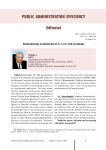Public administration efficiency. Editorial. Рубрика в журнале - Economic and Social Changes: Facts, Trends, Forecast
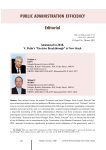
Announced in 2018, V. Putin's “decisive breakthrough” is now stuck
Статья научная
Over the last 10 years, the journal “Economic and Social Changes: Facts, Trends, Forecast” has been presenting articles on relevant problems of Russian society and government in its “Editorial” section once in every two months. Based on expert opinions of a wide range of scientists, sociologists, economists, political and social activists, and a set of factual data, acquired using sociological and statistical tools, a long-term monitoring of the public administration efficiency has been conducted, which allowed assessing the current situation in the country in real time. In Editor-in-Chief’s previous article, published in the journal “Economic and Social Changes: Facts, Trends, Forecast” no.4, we focused on the results of the all-Russian vote on amendments to the Constitution of the Russian Federation, held on July 1, 2020. Amended Constitution significantly strengthens social obligations of the government, and it is aimed at the protection of Russia’s national interests. Besides, the nature of the new Constitution turned out to be relevant in terms of civilizational challenges, because common practice of border shutdowns during COVID-19 epidemic forms new outlines of the world order that strengthen a value of national interests and weaken globalization values, which have been dominant over the last 50 years. Nethertheless, many experts noted after the all-Russian vote that the consolidation of society around constitutional amendments did not work out. The results of our analysis, conducted according to data of the Central Election Commission of the Russian Federation, showed that the share of people, who voted against amendments, exceeded average national numbers in 47 Russian regions out of 86; it was even higher in some oblast centers. Its main reason is people’s disbelief in a desire and abilities of the ruling elites to implement election promises of the President. This situation is primarily caused by a lack of noticeable positive changes in the dynamics of the level and quality of life in the last ten years. In order to enhance this topic, we decided to analyze some key aspects of the whole process of the formation of the new post- Soviet statehood. The President himself initiated and publically announced this reform back in 1999, and he has been controlling its implementation ever since. 56 “The provision of Part 3 of Article 81 of the Constitution of the Russian Federation, limiting a number of terms when one and the same person may hold the office of President of the Russian Federation, applies to the person who held and (or) holds the office of the President of the Russian Federation without regard to a number of terms during which he held and (or) holds this position at the time of entry into force of the amendment to the Constitution of the Russian Federation, which introduces a matching constraint and does not exclude for him the possibility to hold the office of President of the Russian Federation within the period allowed by the specified provision (RF Constitution, Art.81, p. 3.1).
Бесплатно
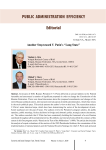
Another step toward V. Putin's "long state"
Статья научная
In January of 2020, Russian President V. V. Putin delivered an annual Address to the Federal Assembly and announced a number of significant proposals in order to change the Constitution of the Russian Federation. There were broad discussions about the proposed amendments and changes of the entire Russian political system, internal and external aspects of public administration, which they entail, in the socio-political space. This article presents the author’s view on this issue. The researchers analyzeV. Putin’s main historical steps, which have been determining the vector of the development of post- Soviet statehood over the past 20 years. The authors review the President’s program articles, his public speeches, public meetings, his key decisions in foreign and domestic policy, strategic system documents, etc. The authors conclude that V. Putin has been consistently building the framework of a new Russian statehood throughout all his presidential terms. He publicly and extensively described the contours of this system in his first program article “Russia at the Turn of the Millennium” (1999). The article also includes the analysis of expert evaluations of the motives of the 2020 Presidential Address; the examination of the implementation of national projects and the National Security Strategy, for which V. Putin took personal responsibility in 2015; statistical data, describing the state of affairs in the areas of demography and health, science and education, economic growth and population’s quality of life over the past 30 years. The results of the study allow us to say that the President’s initiatives, aimed at the transformation of the country’s entire political system, are largely forced. It is a necessary condition for the completion of the goal, set by him in 1999, until the end of his presidential term, limited by the current Constitution of the Russian Federation - the creation of a strong, independent social state with a stable political system, which effectively adapts to internal and external challenges.
Бесплатно
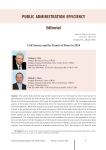
Civil society and the transit of power in 2024
Статья научная
The article deals with the issue of the transit of power in 2024 and the role of civil society in addressing key tasks that the head of state has to deal with in the period before the election to the State Duma of the Russian Federation (2021) and the presidential election (2024). We investigate historical aspects of the transit of power in Russia that show the broad and complex scale of its implications for social development. We provide forecasts and expert assessments of the current situation in the country as a factor in the possible success of the transit of power in 2024. On the basis of the data of the all-Russian and regional sociological studies implemented in the form of a monitoring we analyze the dynamics of public opinion on key issues related to public and personal needs that are actual and expected to be implemented. The analysis reveals that the most acute problems of concern to the population are long-term and unresolved. On the background of the launch (unsuccessful in many ways) of national projects 2018 and worrying forecasts about the prospects for the future of Russia, and given the fact that Russia’s economy has overcome the period of stagnation observed since 2014, this brings to the fore the issue concerning the effectiveness of public administration in the new political cycle in which (according to the Constitution of the Russian Federation) Vladimir Putin will not be able to take the post of head of state. In the “transit” period (the period remaining until the State Duma election of 2021 and the presidential election of 2024), the President has to deal with the tasks of a higher level. One of them is related to the implementation of the potential of civil society accumulated over the past 20 years, since civil society is an active entity representing the interests of the general population in dialogue with the authorities at all levels of government. The solution to this problem can guarantee a successful “transit” of the Russian society in a new historical period.
Бесплатно
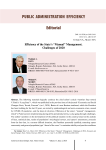
Efficiency of the state's “manual” management. Challenges of 2020
Статья научная
The following materials logically continue the chief editor’s article «Another Step towardV. Putin’s “Long State”», which was published in the previous issue of the journal “Economic and Social Changes: Facts, Trends, Forecast” (no.1, 2020). Basics of a new Russian statehood, which the President has been building for the last 20 years, are tested by epidemiological and socio-economic crises, caused by COVID-19 pandemic, and the drop of oil prices. Efficiency of the state’s “manual” management, which V. Putin has been implementing during all his presidential terms, is also going through challenges. The author’s position on the development of the political situation in the country, based on the analysis of facts, statistical data, results of population’s sociological surveys, and experts’ assessments, proceeds from the fact that, in a current difficult situation, the President personally (publicly, attracting expert community and general population) get “ahead of the curve” to maintain stability and provide conditions for the long-term implementation of the prospective political course of the country’s development. Such actions include timely initiation of the large-scale discussion and the adoption of the respective law on amending the Constitution of the Russian Federation and the provision of the ensured opportunity to continue national-oriented development course for the next 15 years at least. Thus, despite force majeure global circumstances and complicated domestic situation, the President takes steps aimed at the preservation and strengthening of the Russian statehood in the future. It once again shows the historical role of V. Putin and allows us to expect with cautious optimism the Russia’s “withdrawal” from the current situation without, at least, losses for national security and competitiveness while keeping prospects for further sustainable development.
Бесплатно
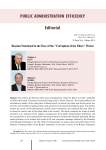
Russian statehood in the face of the “corruption of the elites” threat
Статья научная
The article is the final part of the series of publications “From the Editor-in-Chief”, published in 2020 in the journal “Economic and Social Changes: Facts, Trends, Forecast”. Its central problem is the unsatisfactory quality of the ruling elites in Russia which, for almost the entire post-Soviet period, has been the main problem of stalling reforms and achievement of national development goals. The authors analyze the causes of this phenomenon; provide expert assessments and statistical data that allow us to assess the current state of the ruling elites in the country. The article examines the trends of public sentiment as an indicator of the negative consequences of the public administration inefficiency and the unrealization of social expectations from the government and from the President personally. We pay special attention to the content and results of the anti-corruption campaign initiated by the President of the Russian Federation in the mid-2010s. For this purpose, we analyze data of monthly reports of the Ministry of Internal Affairs of the Russian Federation on the state of crime in the Russian Federation for the period from 2003 to October 2020, statistics of the Judicial Department at the Supreme Court of the Russian Federation on the state of criminal records in Russia for the period from 2012 to the first half of 2020, materials of mass media, and opinions of experts. The authors come to the conclusion that it is necessary to move from episodic, or “demonstrative”, criminal cases with a common motive being an internal political processes to systematic preventive work on the nationalization of the ruling elites. Its purpose is not to maintain a balance of interests within the elite groups but to solve the key tasks of national development: achieving social justice, reducing inequality, dynamic growth in the level of income and quality of life of the population. This approach mostly corresponds to the new socially oriented Constitution of 2020, and, ultimately, it allows hoping for the solution of many problems in the system of state administration, as well as for the development of Russian statehood in the civilizational and historical context.
Бесплатно
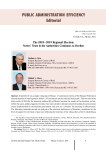
The 2018-2019 regional election: voters’ trust in the authorities continues to decline
Статья научная
September 8 was a single voting day in Russia: 13 constituent entities of the Russian Federation elected deputies of state legislative bodies; 19 constituent entities elected their heads. This was one of the main events of 2019 for the domestic political life of Russia, because the results of the elections, in fact, reflect the socio-political agenda of today; they show people’s attitude toward the political and economic course implemented by the Russian government and serve as a criterion for assessing its effectiveness. The following materials provide an analysis of the electoral preferences of Russians, manifested in the level of support for the head of state and reflecting the interests of the ruling elites of the United Russia party; in the dynamics of voter turnout in Russia and in the number of votes cast for parliamentary parties representing the systemic opposition. To obtain an objective “picture” of today, we analyse the results of the previous elections (2017-2018), as well as the last three elections to the State Duma (2007, 2011, 2016) and the presidential elections in which Vladimir Putin took part (2000, 2004, 2012, 2018).
Бесплатно
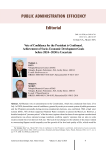
Статья научная
All-Russian vote on amendments to the Constitution, which was conducted from June 25 to July 1 of 2020, showed that a vote of confidence, granted by society to a current system of public governance and the President personally during previous presidential elections, was confirmed. With a high voter turnout (68%), 78% of them supported Vladimir Putin’s initiative to amend the Main Law. However, a detailed analysis of “pressure points” of the last vote (regions where the share of votes against constitutional amendments was above national average numbers) confirms experts’ opinions that an idea to unite society around this event did not work out. The lack of real changes in the solution of key issues related to overcoming flagrant social inequality and the growth of the level and quality of life, which would be visible to general population, leads to people’s exhaustion from another positive goals of socio-economic development that might not be fulfilled once again and remain only in a declarative form. It affected the dynamics of public opinion, and, in particular, it echoed in a high level of protest in most Russian regions (in 47 out of 86), its regional centers, and large industrial towns during all-Russian vote on amendments to the Constitution. At the same time, the President’s Executive Order on Russia’s national development goals through 2030, dated July 21, 2020, pushes back dates of national projects’ implementation (from 2024 to 2030) once again and additionally decreases the level of optimism toward the implementation of national development goals until 2024 - exactly until the next elections of the President of the Russian Federation. An analysis of factual information and expert assessments, carried out by the authors, forces to state that, despite another vote of confidence granted by society to the President and his system of governance, the future of Russia’s socio-economic development (at least until 2024-2030) remains unclear, and it increases residents’ fears for their own and their families’ life prospects, as well as for the country itself. In these circumstances, it is difficult to disagree with an opinion of several experts that, in order to overcome long-standing unresolved vital problems that concern population and improve the efficiency of the public administration system, it is necessary to take active steps (primarily by the President) toward the nationalization of ruling elites. Continuing balancing between liberal and state-patriotic forces in power may once again lead to failures in achieving key national development goals, which threatens the legitimacy and the very future of the Russian statehood.
Бесплатно

